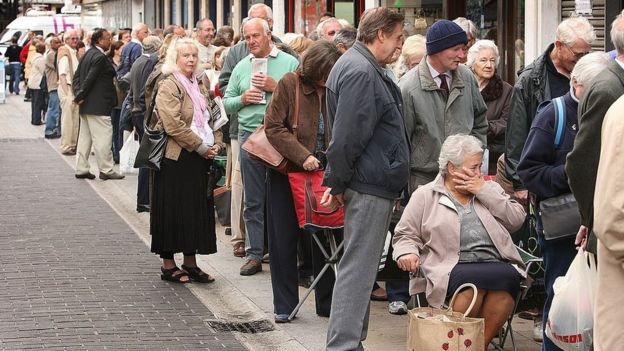Every Man and His Dog
It has already started. Stories about financial crashes and credit crunches. You see, the 10th Anniversary of the Great Financial Crisis is upon us this month.
Lehman Brothers collapse was the start of the Credit Crunch, the Stock Market Crash and the Quantitive Easing that ensued. So be prepared for article after article and wall to wall expert commentary focussing on what went wrong 10 years ago. But be prepared for the inevitable doom-mongers stating that 10 years on, it’s about to happen again.
I had to laugh when I heard Gordon Brown’s recent comments that the “End is nigh!”. Strange really, the meltdown happened on his watch and he didn’t see it coming back then when it was his job. I remember him saying the days of boom and bust are over prior to the biggest bust in living history.
Does History Repeat Itself?
History doesn’t repeat itself but it rhymes. – Mark Twain
Back then our Moderate Portfolio was 42% in Cash. It seemed I must have had a crystal ball. I remember that time well. The writing was on the wall prior to the eventual snap. I became aware of the pressure building from mid 2007. If like me you read the right stuff and joined all of the dots, it was prudent to become cautious when all around were filling their boots. Here was the anecdotal evidence in my eyes.
Exhibit A
In June 2007 I did something naughty. I dared to think for myself. Now the Financial Regulator is not a fan of that type of action. Although they don’t say that they know best, if you don’t follow their guidelines and a customer complains, then you are wrong. Not following guidelines can be career ending. I felt as though I was daring to ski off-piste for the first time.
Following a meeting attended by many other Financial Advisers, I was astonished to hear that Advisers were investing their customers entire life savings into Commercial Property Funds. “You can’t go wrong, the returns have been so good”. It was true. 14% – 11% – 17% were the returns over the previous 3 years. After a little soul searching I sold our entire commercial property holdings across the client bank. At that time an allocation of approximately 25% of savings held in commercial property funds was thought of as prudent. Three weeks later Norwich Union suspended all redemptions from their property fund. Every other commercial property fund followed suit as the word got around and the stampede out the door had to be stopped. It was impossible for these insurance companies to sell the buildings and to raise the cash. All investors money was locked in for many months, in the meantime the valuation of those funds fell by approximately one third. Investors did not understand the illiquidity of property funds, why should they? The investment was being sold as “You can’t go wrong, the returns have been so good”. We just got out by the skin of our teeth.
Exhibit B
Shortly after, Standard Life did a strange thing. They had a Cash Fund as did many insurance companies at the time. In early 2008 the value of it fell by 5%. Advisers were out-raged. This is cash. How can it drop in value? The explanation came like a bolt of lightning. The cash wasn’t just sat in the bank, it had been lent to others who were charged a higher interest rate. Much like Peer to Peer lending today. This cash was only as safe as the borrowers ability to meet their interest payments and pay-back their debts. A much riskier proposition than just cash in the bank I would suggest. Advisers had not been told this, the funds were advertised as a better return than a bank with no more risk attached. The only reason the fund was forced to reduce it’s unit price was because redemptions were running faster than new savings were being invested. The rush for the exit had started. Advisers were using the cash fund as short term but Standard Life was taking the money and investing it in long term mortgages.
Exhibit C
In the Spring of 2008 Northern Rock needed the UK Government to throw them a lifeline. They were eventually nationalised. They had already been the biggest faller on the FTSE 100 that year, their shares losing 95% of their value. At the time I also arranged mortgages for clients. Northern Rock was at the vanguard of stretched lending policies. Not only would they offer a 100% mortgage to anyone who could steam up a mirror, but then they invited those same individuals to borrow a further 15% on top! If house prices did not continue to rise it would end it tears. I remembered the price falls in the early 90’s and the negative equity that persisted for many years after. I never arranged one of those mortgages, but I knew many advisers who did. As Northern Rock had pushed the envelope, many other lenders followed suit in offering “easy credit”. They all borrowed short term money and used it to buy long term assets. Not prudent.
I had no experience of just how bad lending policy had become in the US, but we in the UK were no better.
Eventually luck played it’s part
By mid 2008 I had sold half of all the share funds that we owned. I reduced by 50% because I didn’t know what was going to come, but it seemed that excessive risks were being taken all around. The stock markets continued to rise. I can recall how sick I felt at the time. We had all lost out on that growth, which seemed to be rising all the time.
I had a holiday booked and whilst away on a ship in the Caribbean I decided that I was wrong. There had been no disaster, I was looking foolish and I decided to invest back into the markets on my return. That was September 2008. Before I got back Lehman Brothers filed for bankruptcy on 15th September. It was an awful time, I knew we had all lost money, but I knew we had now done better than most. My decision to hold a large amount of cash, real cash, meant we could get ready to invest back into the markets and having dodged some of the huge falls, could hopefully fully participate in the recovery.
2008 – 2018
There are many reasons why a crash won’t occur after exactly 10 full revolutions of this planet around our sun. One of which is that it occurs when the markets are closed on a Saturday. I’m sure their will be endless opportunities for you to read about the crash of 2008, or watch documentaries on TV over the coming days. Please choose what you read and what you watch carefully. There will be a small contingent who will see this as a sales pitch opportunity.
In 2008 I said I could smell smoke, but I didn’t know what was burning.
Today in 2018, I know that some of those fires continue to burn and others have flared up since. Since January 2008 (before the Great Financial Crisis) through to today, our Moderate Portfolio has grown by over 140%. It is currently 33% in cash and has never held less than 18% in cash over the intervening period. It holds no government debt, no peer to peer lending, no commercial property funds, no emerging market funds, no China, Far East, Japan, Turkey, Russia…..
Final Word
Over 2/3rds of my clients today were clients back then. We each lived through that crash. Like all investors, that period of time has moderated the investment risks we have taken ever since. This has been a slow motion rise in value. It certainly hasn’t been a get rich quick scheme. This market rally has been the most hated rally of all time. The “End is nigh!” has been called hundreds of times so far.
This rally will inevitably end at some point. Hopefully we will be ready, but I’m not arrogant enough to suggest that I have a crystal ball and that I know what will eventually trigger that fall and when it will occur.


Italian politics and ECB end of QE. Italian/German bond spread already at RED.
Who or what removes the pin from the grenade is not clear but my bet would be on Turkey.
There is only one thing you can guarantee and that is that things will change, but you do your best to make sure we are not on the bit of the iceberg that is about to break off.
My perspective is
-There is massive debt held in the US and Europe. When will this bubble burst and how will it affect us?
Cash rich companies and those who benefit from the lower pound would appear good.
-At home many of us in the bulge year generation are comfortable in our high value mortgage free homes. Who will buy them when we want to release equity or pass on our inheritance. This market could become over supplied, causing a slide in valuations.
What makes me happy is having you to look after us Howard